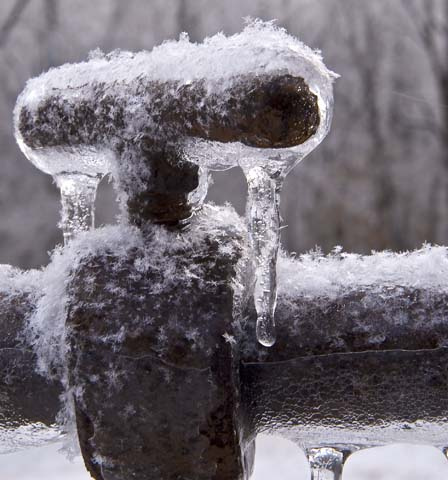Avoiding Frozen Pipes: Top Tips for Winter
Avoiding Frozen Pipes: Top Tips for Winter
Blog Article
What're your thoughts on Preventing and dealing with frozen pipes?

Winter can damage your plumbing, specifically by freezing pipes. Here's exactly how to avoid it from happening and what to do if it does.
Intro
As temperatures decline, the danger of icy pipes increases, possibly leading to expensive repairs and water damage. Recognizing how to avoid icy pipes is important for home owners in cool environments.
Prevention Tips
Insulating vulnerable pipelines
Cover pipelines in insulation sleeves or utilize heat tape to protect them from freezing temperature levels. Concentrate on pipes in unheated or exterior locations of the home.
Home heating strategies
Keep interior rooms appropriately warmed, particularly areas with pipes. Open up cupboard doors to permit warm air to distribute around pipelines under sinks.
How to determine frozen pipes
Seek reduced water circulation from faucets, uncommon smells or noises from pipes, and noticeable frost on exposed pipes.
Long-Term Solutions
Architectural adjustments
Consider rerouting pipelines far from outside wall surfaces or unheated locations. Include extra insulation to attics, cellars, and crawl spaces.
Updating insulation
Invest in top notch insulation for pipelines, attic rooms, and wall surfaces. Correct insulation assists keep constant temperatures and minimizes the risk of icy pipelines.
Protecting Outside Pipes
Yard tubes and outdoor faucets
Separate and drain pipes yard hose pipes before winter months. Install frost-proof faucets or cover outside faucets with insulated caps.
Recognizing Frozen Pipelines
What creates pipelines to freeze?
Pipelines freeze when revealed to temperatures listed below 32 ° F (0 ° C) for extended periods. As water inside the pipes ices up, it broadens, putting pressure on the pipe wall surfaces and potentially creating them to burst.
Threats and damages
Frozen pipes can cause water system interruptions, residential property damage, and expensive repair work. Ruptured pipes can flood homes and cause substantial structural damages.
Indications of Frozen Pipes
Determining icy pipelines early can avoid them from bursting.
What to Do If Your Pipes Freeze
Immediate actions to take
If you think frozen pipelines, keep faucets open up to soothe pressure as the ice melts. Use a hairdryer or towels taken in warm water to thaw pipelines slowly.
Conclusion
Preventing icy pipelines needs positive measures and fast actions. By understanding the reasons, indicators, and safety nets, property owners can protect their pipes during cold weather.
6 Proven Ways to Prevent Frozen Pipes and Protect Your Home
Disconnect and Drain Garden Hoses
Before winter arrives, start by disconnecting your garden hoses and draining any remaining water. Close the shut-off valves that supply outdoor hose bibs and leave the outdoor faucet open to allow any residual water to drain. For extra protection, consider using faucet covers throughout the colder months. It’s also important to drain water from any sprinkler supply lines following the manufacturer’s directions.
Insulate Exposed Pipes
Insulating your pipes is an effective way to prevent freezing. Pipe insulation is readily available at home improvement stores and is relatively inexpensive. Pay close attention to pipes in unheated areas such as the attic, basement, crawl spaces, or garage. Apply foam insulation generously to create a buffer against the cold. You can also wrap your pipes in heat tape or thermostat-controlled heat cables for added warmth.
Seal Air Leaks
Inspect your home for any cracks or openings that could let in cold air. Seal any holes around the piping in interior or exterior walls, as well as the sill plates where your home rests on its foundation. Additionally, make sure to keep your garage door closed unless you’re entering or exiting. Leaving it open creates a significant air leak that can lead to frozen pipes.
Allow Warm Air Circulation
During cold snaps, it’s essential to allow warm air to circulate evenly throughout your home. Leave interior doors ajar to promote better airflow. Open kitchen and bathroom cabinets to help distribute heat consistently around the rooms. If you have small children or pets, be sure to remove any household chemicals or potentially harmful cleaners from open cabinets for safety.
Let Faucets Drip
A small trickle of water can make a big difference in preventing ice formation inside your pipes. When temperatures drop significantly, start a drip of water from all faucets served by exposed pipes. This continuous flow helps prevent the water from freezing. Additionally, running a few faucets slightly can relieve pressure inside the pipes, reducing the chances of a rupture if the water inside does freeze.
https://choateshvac.com/6-proven-ways-to-prevent-frozen-pipes-and-protect-your-home/

I stumbled upon that entry about Helpful Tips to Prevent Frozen Pipes this Winter while surfing around the internet. Loved our write-up? Please share it. Let other people locate it. We cherish your readership.
Schedule A Service Report this page